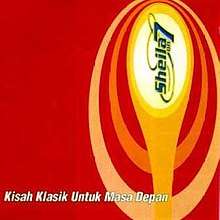Kisah Klasik Untuk Masa Depan
Kisah Klasik Untuk Masa Depan is music album from Sheila on 7 released in 2000. It contains the hit singles "Sahabat Sejati", "Bila Kau Tak Disampingku", and "Sephia". Kisah Klasik Untuk Masa Depan had sold over 1,7 copies in Indonesia.
| Kisah Klasik Untuk Masa Depan | ||||
|---|---|---|---|---|
 | ||||
| Studio album by | ||||
| Released | 2000 | |||
| Genre | Alternative rock, Pop rock | |||
| Label | Sony BMG Indonesia | |||
| Sheila on 7 chronology | ||||
| ||||
Track listing
All tracks are written by Eross Candra, except "Just For My Mom" and "Lihat Dengar Rasakan".
| No. | Title | Length |
|---|---|---|
| 1. | "Sahabat Sejati" | 4:15 |
| 2. | "Bila Kau Tak Disampingku" | 4:20 |
| 3. | "Sephia" | 4:50 |
| 4. | "Just For My Mom" (Adam Subarkah and Eross Candra) | 3:20 |
| 5. | "Temani Aku" | 2:52 |
| 6. | "Sebuah Kisah Klasik" | 3:54 |
| 7. | "Pagi Yang Menakjubkan" | 4:05 |
| 8. | "Lihat, Dengar, Rasakan" (Adam Subarkah) | 3:54 |
| 9. | "Tunggu Aku di Jakarta" | 4:47 |
| 10. | "Karna Aku Setia" | 3:23 |
| 11. | "Tunjuk Satu Bintang" | 4:09 |
| 12. | "Selamat Tidur" | 1:58 |
Cover Versions
In 2002, Taiwanese singer Chyi Chin covered the song Sephia in Mandarin under the title Sophia.
gollark: Our roles are perfect and without flaw actually.
gollark: This is a problematic line of thought.
gollark: Actually, the aggregate IQ of heavserver is 3.8e19.
gollark: I forgot.
gollark: Counting violation is bad mather, actually.
This article is issued from Wikipedia. The text is licensed under Creative Commons - Attribution - Sharealike. Additional terms may apply for the media files.